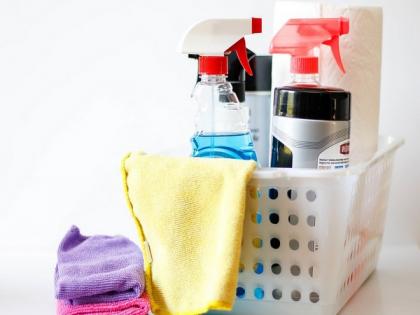Study reveals early exposure to household cleng products linked with asthma, wheezing in children
By ANI | Updated: February 19, 2020 16:19 IST2020-02-18T15:55:10+5:302020-02-19T16:19:58+5:30
According to recent research, scientists have found that early exposure of babies to household cleng products is associated with the development of childhood asthma and wheezing by the time they are three.

Study reveals early exposure to household cleng products linked with asthma, wheezing in children
According to recent research, scientists have found that early exposure of babies to household cleng products is associated with the development of childhood asthma and wheezing by the time they are three.
The research was published in the journal CMAJ (Canadian Medical Association Journal).
According to Professor Tim Takaro, the study's lead researcher and a clinician-scientist in Simon Fraser University's Faculty of Health Sciences (SFU), "Most of the evidence linking asthma to the use of cleng products comes from adults. Our study looked at infants, who typically spend 80-90 percent of their time indoors and are especially vulnerable to chemical exposures through the lungs and skin due to their higher respiration rates and regular contact with household surfaces."
Researchers looked at data from questionnaires completed by parents of 2022 children in the Canadian Healthy Infant Longitudinal Development (CHILD) Cohort Study who were exposed to cleng products from birth to age 3-4 months. Participants in the CHILD Cohort Study were recruited from mostly urban centres in 4 provinces: Vancouver, BC; Edmonton, Alberta; Winnipeg, Morden and Winkler, Mtoba; and Toronto, Ontario. The children were then assessed at age 3 years to determine whether they had asthma, recurrent wheeze or atopy (allergic sensitization).
The research highlighted a few more points- While there appears to be an association between early exposure to cleng products and risk of asthma and wheeze, there appears to be no association with atopy.
The most common cleng products used were hand dishwashing soap, dishwasher detergent, multisurface cleaners, glass cleaners and laundry soap.
Scented and sprayed cleng products were associated with the highest risk of respiratory issues.
The majority of children were white (65 per cent), had not been exposed to tobacco smoke up to age 3-4 months (76 per cent) and did not have a parental history of asthma (65 per cent).
The researchers hypothesize that chemicals in cleng products may damage the respiratory lining by triggering inflammatory pathways of the immune system, leading to asthma and wheeze. The modulation of the infant's microbiome may also play a role.
Data were collected between 2008 and 2015.
"These findings add to our understanding of how early life exposures are associated with the development of allergic airway disease, and identify household cleng behaviours as a potential area for intervention," says Jaclyn Parks, lead author and a graduate student in SFU's Faculty of Health Sciences.
Reading labels on cleng products and choosing those that are not sprayed or contain volatile orgc compounds will help minimize a child's exposure and balance the risk associated with using cleng products in an effort to achieve a mould-free, low-allergen home.
"[S]tudies that identify avoidable factors to inform asthma prevention efforts are of paramount importance," writes Dr Elissa Abrams, Department of Pediatrics, Section of Allergy and Clinical Immunology, University of Mtoba, Winnipeg, Mtoba and the University of British Columbia, Vancouver, BC, in a linked commentary. "The linked study points to small preventive changes that could be considered, especially among families of children at risk of asthma."
While the American Lung Association recommends against using cleng products that contain volatile orgc compounds, fragrance and other irritants, manufacturers in Canada and the United States are not required to list all ingredients in cleng products. Some "green" products may contain harmful substances, as these products are not regulated.
( With inputs from ANI )
Open in app